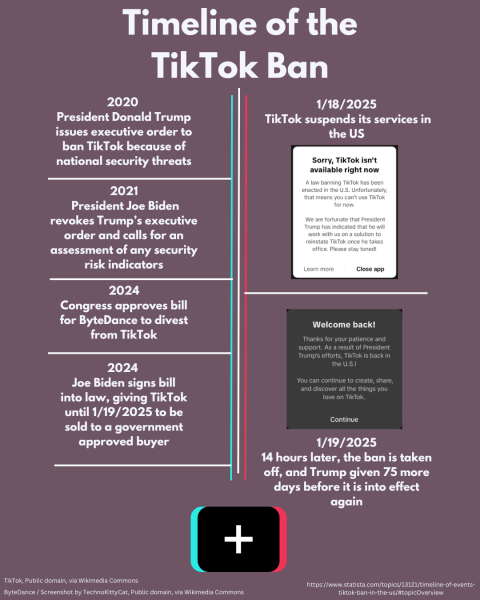On April 24, 2024, President Joe Biden signed a law stating that ByteDance had until January 19, 2025 to sell TikTok to a government-approved buyer. Biden left the decision in the hands of the Trump administration. TikTok was unavailable in the US on Jan. 19 for 14 hours before the ban was reversed.
Ninth grader Sam Worral is indifferent about the ban.
“It doesn’t affect me much since I’ve really never had TikTok, but I feel like it might affect some people who have used it because they might have built up an account with a lot of followers or have post[ed] a lot of videos and have a lot of memories,” Worral said.
Upon returning, a message displayed on the home page thanked President Donald Trump’s efforts. Trump later stated that he unbanned the app for 75 days because he “got to use it,” further explaining how TikTok is meant for kids and nobody should be infringing upon kids’ private information. This means that the ban will be postponed until Apr. 4.

The app was originally banned due to privacy concerns regarding China’s alleged ability to spy on Americans. Specifically, the Chinese government could take users’ data and information, making it a national security risk. Trump has given ByteDance two options: sell TikTok to a buyer from America or any allied country.
In 2020, Trump also tried to have TikTok banned by signing an executive order to have the social media platform banned from the United States. The legislation that was passed recently to ban TikTok states that it is “unlawful to provide services to distribute, maintain, or update the social media platform Tiktok.”
For sophomore Roman Hozalski, the dominant feeling following the ban was dismay.
“I was very disappointed and I didn’t really understand the reasoning behind it…I think, just in the short time frame [TikTok] was banned, it wasn’t really that bad.”
TikTok is a social media platform owned by ByteDance where almost 170 million people are active monthly in the U.S. and 1.6 Billion across the world. Users on TikTok can watch, create, and share content with people. TikTok boomed in popularity during the 2020 lockdown worldwide and has maintained its popularity since.
Hozalski feels prepared for a time when the app is gone for good. “I think I’ll just be more prepared for it, and it won’t really be a shock next time. And there’s obviously other social media platforms, so I don’t think it’ll be a big issue when it gets banned the second time, or if it gets banned.”
As TikTok remains under fire, people around the world have looked to other social media platforms that replicate the experiences they get on TikTok. Rednote, for example, was an app that rose to #1 on the Apple App Store thanks to those claiming to be “TikTok refugees”– a large group of TikTokers who joined Rednote after the ban. According to NPR, Rednote is considered to be “China’s answer to Instagram,” meaning that China can compete with the major social media platforms from the U.S by having their own version of Instagram. Additionally, other platforms like Snapchat Spotlight, YouTube Shorts, and Instagram Reels all share the short-form content style of TikTok, a possible alternative as the app’s future remains uncertain.
Trump’s order begs the question: who could ByteDance sell the platform to, if that’s even a possibility? Currently, ByteDance is not particularly interested in selling, but rising contenders including Elon Musk and Larry Ellison, two figures who Trump suggested could buy TikTok. Trump also states that they should give 50% ownership to the U.S.